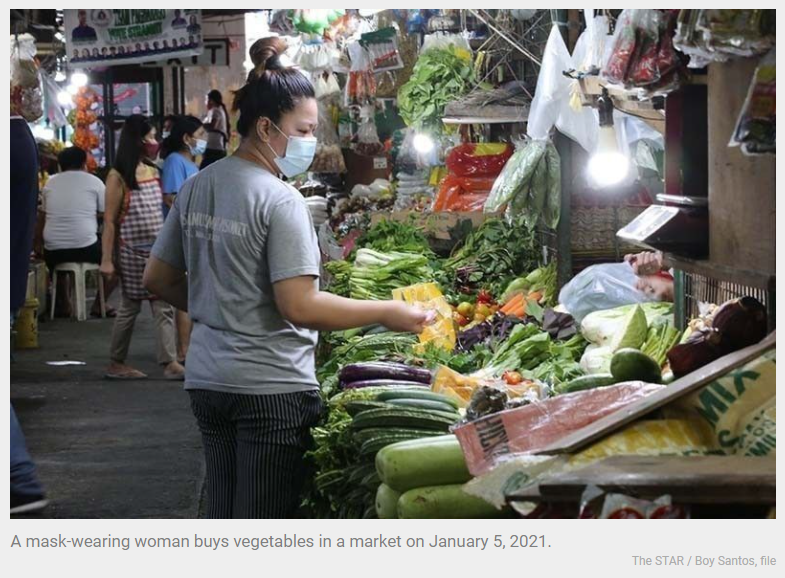Philippines: Inflation likely accelerated below 5% in October
MANILA, Philippines — Most economists believe inflation in October likely remained below five percent despite elevated food prices, as well as higher oil prices and electricity costs.
Security Bank chief economist Robert Dan Roces said inflation likely rose to 4.9 percent in October after slipping to 4.8 percent in September.
The bank set a forecast range of 4.7 to 5.1 percent, with upside push coming from food and utilities.
“On the food basket, fruits and upland vegetables are pricey, but offset by pork and lowland vegetables with the month-on-month change in the food basket estimated at 0.4 percent,” Roces said.
Roces said the month-on-month inflation for utilities likely accelerated by 0.5 percent on the back of higher electricity costs.
“Primary upside risks include global oil price movements, which may translate to pressures on transport and utilities. Food prices are still elevated and remain susceptible to any supply snags, such as a delay in meat imports,” Roces said.
Jun Neri, lead economist at Ayala-led Bank of the Philippine Islands, said inflation picked up to 4.9 percent last month, but the Bangko Sentral ng Pilipinas (BSP) is seen maintaining its accommodative monetary policy for the rest of the year.
“Just like in previous months, the Monetary Board will likely downplay the October inflation print as merely transitory and will unlikely affect their policy setting in either their November or December meeting,” Neri said.
For his part, UnionBank chief economist Ruben Carlo Asuncion said inflation further eased to 4.7 percent in October from 4.8 percent in September despite the elevated oil prices.
“However, the food consumer price index, which carries a huge weight overall, had mixed movement in October, providing a muted upward pressure on the total print,” Asuncion said.
The Aboitiz-led bank sees the central bank holding on to current monetary policy rates.
Alvin Arogo, economist at Philippine National Bank (PNB), said inflation last month likely averaged 4.6 percent, and expects the BSP to continue to allow the real reverse repurchase rate to remain negative in the coming months.
“In our view, the higher base for food and non-alcoholic beverages and transport will aid in slowing down CPI growth during the last quarter of the year,” Arogo said.
According to Arogo, the central bank continues to recognize that high inflation is mainly supply-side driven and that the country’s economic recovery is uncertain.
“As such, we keep our baseline view that the reverse repurchase rate will stay at two percent until a 25-basis-point rate hike at end-third quarter of 2022,” Arogo said.
However, Rizal Commercial Banking Corp. chief economist Michael Ricafort said inflation likely accelerated to five percent in October from 4.8 percent in September, largely due to the damage from Tropical Storm Maring, which could lead to some temporary increase in food and other commodity prices, higher global oil prices and weaker peso exchange rate.
Ricafort said the upward price pressures could lead to higher import prices, higher transport costs and electricity rate hikes.
Mathematically, Ricafort explained inflation could have already reached the peak in October and would start to ease by November and December due to the higher base effects by then.
The Yuchenghco-led bank said inflation could ease from the three to four percent range toward the end of the year
“Accommodative monetary policy still expected to continue, with the key local policy rate to remain at the record low of two percent as long as necessary, as much of the increase in inflation has been due to supply-side factors that are better addressed by non-monetary measures and not through tighter monetary policy,” Ricafort said.
The BSP said inflation likely settled between 4.5 and 5.3 percent in October.
Source: https://www.philstar.com/business/2021/11/01/2138081/inflation-likely-accelerated-below-5-october


 Thailand
Thailand




